Idcol plans big for industrial rooftop solar

The Infrastructure Development Company Ltd (Idcol) has big plans to invest in industrial rooftop solar power projects in line with the government target to meet 30 per cent of Bangladesh's energy needs from clean sources by 2030.
Through its investments, the fully state-owned specialised non-bank financial institution (NBFI) aims to generate cheaper electricity, cut emissions and dependency on fossil fuels, and eventually complete the Mujib Climate Prosperity Plan (MCPP).
Under the MCPP, Bangladesh intends to obtain 30 per cent of its energy from renewable sources by 2030 with a significant portion of that electricity coming from rooftop solar power systems.
The MCPP is pursuing global green investment funds for domestic green energy development programmes, and taking initiatives to enhance the public-private financial sector's capabilities in this regard.
"Initially, Idcol will finance rooftop solar projects that will generate about 300 megawatts of electricity by 2024," said Abdul Baki, chief executive officer (in-charge) of the NBFI.
"If current investments are successful, we will go for bigger projects as Bangladesh has potential to generate a few thousands megawatts of electricity from rooftop solar power systems," he added.
Idcol, the local market leader in renewable energy financing, already approved 41 projects that will collectively generate 50 megawatts of electricity while another 15 projects to produce a total of 52 megawatts are in the pipeline.
The projects in operation include a 2.66 megawatt rooftop solar power plant at the Square Textiles factory in Kashimpur union, a 2.02 megawatt plant at Fakhruddin Textile Mills in Sreepur upazila, a 1.72 megawatt plant at Aswad Composite in Mawna union, a 1.1 meagatwatt plant at Far East Spinning Industries in Habiganj, and a 0.99 megawatt plant AT Snowtex Outerwear in Dhamrai.
Idcol's investments in local projects mainly come from two sources: the World Bank and KfW, a German state-owned investment and development bank.
Both lenders combined have provided about Tk 1,500 crore to Idcol to finance rooftop solar power projects.
Idcol's financial schemes include a term loan facility for up to 80 per cent of a project's cost for a 10-year term with a one year grace period. The interest rate is fixed at as much as 5.5 per cent with monthly repayment.
According to Idcol, if any company installs a one megawatt rooftop solar plant by investing Tk 5.31 crore, it will get a benefit of over Tk 10 crore in the next 20 years.
"So, it's very cost effective," Baki said.
For example, while grid tariff with VAT for each unit of electricity is currently set at Tk 8.09, the price per unit of power generated from rooftop solar projects would be Tk 6.02.
H&M PROMOTING ROOFTOP SOLAR
Swedish multinational clothing company H&M is promoting rooftop solar technology among its enlisted local suppliers.
Idcol organised a workshop on the installation of industrial rooftop solar systems with the participation of officials of H&M garment suppliers at the InterContinental Dhaka yesterday.
The workshop discussed various aspects regarding rooftop solar projects, including their financial and technical benefits.
The workshop also focused on the net metering benefits for industries and discussed how rooftop solar projects can help H&M's local supplier base reduce their carbon footprint and get more work orders from international buyers.
"The companies who will install rooftop solar plants at its factory will get some benefits, including more orders," an official of H&M told The Daily Star, adding that every supplier has to undertake such a project.
Approximately 80 factories in the country that supply products to H&M have already installed rooftop solar systems with a collective generation capacity of around 7 megawatts.
This comes in line with H&M Group's commitment to become climate positive throughout its entire value chain by 2040.

 For all latest news, follow The Daily Star's Google News channel.
For all latest news, follow The Daily Star's Google News channel. 



Comments